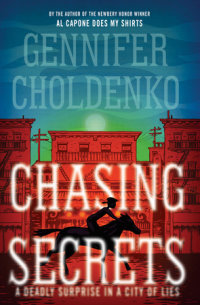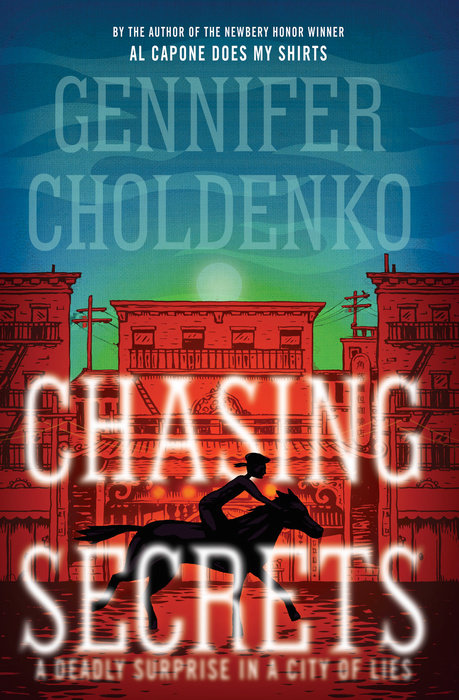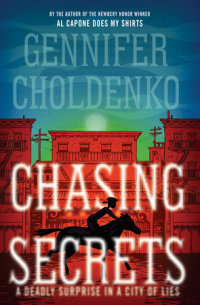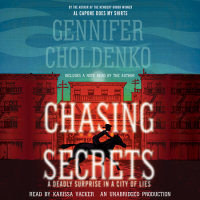Chasing Secrets
Author Gennifer Choldenko
Newbery Honor–winning author Gennifer Choldenko deftly combines humor, tragedy, fascinating historical detail, and a medical mystery in this exuberant new novel.
San Francisco, 1900. The Gilded Age. A fantastic time to be alive for lots of people . . . but not thirteen-year-old Lizzie Kennedy, stuck at Miss Barstow’s snobby school for girls. Lizzie’s secret passion is science, an unsuitable subject for finishing-school girls. Lizzie lives to go on house calls with her physician father. On…
Newbery Honor–winning author Gennifer Choldenko deftly combines humor, tragedy, fascinating historical detail, and a medical mystery in this exuberant new novel.
San Francisco, 1900. The Gilded Age. A fantastic time to be alive for lots of people . . . but not thirteen-year-old Lizzie Kennedy, stuck at Miss Barstow’s snobby school for girls. Lizzie’s secret passion is science, an unsuitable subject for finishing-school girls. Lizzie lives to go on house calls with her physician father. On those visits to his patients, she discovers a hidden dark side of the city—a side that’s full of secrets, rats, and rumors of the plague.
The newspapers, her powerful uncle, and her beloved papa all deny that the plague has reached San Francisco. So why is the heart of the city under quarantine? Why are angry mobs trying to burn Chinatown to the ground? Why is Noah, the Chinese cook’s son, suddenly making Lizzie question everything she has known to be true? Ignoring the rules of race and class, Lizzie and Noah must put the pieces together in a heart-stopping race to save the people they love.
Winner of a Los Angeles Public Library FOCAL (Friends of Children and Literature) Award
Nominated for:
Pennsylvania Young Reader’s Choice Awards
Tennessee Volunteer State Book Award (Middle School division)
Missouri Association of School Librarians (MASL) Readers Award
California Library Association’s Beatty Award, Eureka List
An Excerpt fromChasing Secrets
Chapter 1
The Cook, the Maid, Our Horse, and Papa
I find a spot on the bench in front of the line of carriages, buggies, and one stalled motorcar facing the wrong direction, trying my best to ignore the other girls’ whispered plans as they climb into each other’s buggies after school. They’re going to wear split skirts and bicycle in Golden Gate Park, or carry parasols and wear hats and gloves to shop at the Emporium, or go to each other’s houses to try on new cotillion dresses. I crack open my book as more girls sweep by. A book is a friend you take with you wherever you go.
Gemma leans on her crutches next to the bench, resting her black-stockinged toe on the ground. Her sprained ankle is bandaged in a crisscross pattern--very different from the way my father does it. Gemma has blue eyes, reddish-blond hair, and full cheeks that always look feverish. “What are you reading about?”
“Mucus,” I tell her. “Did you know your nose produces a flask full of mucus every day?”
Gemma…
Chapter 1
The Cook, the Maid, Our Horse, and Papa
I find a spot on the bench in front of the line of carriages, buggies, and one stalled motorcar facing the wrong direction, trying my best to ignore the other girls’ whispered plans as they climb into each other’s buggies after school. They’re going to wear split skirts and bicycle in Golden Gate Park, or carry parasols and wear hats and gloves to shop at the Emporium, or go to each other’s houses to try on new cotillion dresses. I crack open my book as more girls sweep by. A book is a friend you take with you wherever you go.
Gemma leans on her crutches next to the bench, resting her black-stockinged toe on the ground. Her sprained ankle is bandaged in a crisscross pattern--very different from the way my father does it. Gemma has blue eyes, reddish-blond hair, and full cheeks that always look feverish. “What are you reading about?”
“Mucus,” I tell her. “Did you know your nose produces a flask full of mucus every day?”
Gemma makes a face. “A flask full . . . Don’t tell me you drink it?”
“Actually, I do. Everyone does.” I know I shouldn’t say things like this. Aunt Hortense says I try hard to be peculiar. But she’s wrong; I come by it quite naturally.
“Did Spencer ask you yet?” Hattie with the pouty lips calls to Gemma.
Gemma turns to answer. I don’t hear what she says. It isn’t intended for me. Nothing they say ever is.
It’s been a long time since I’ve had a friend my age. I should be used to it by now. I was eleven when Aunt Hortense insisted I enroll in Miss Barstow’s School for Young Women, where every girl learns the virtues of patience, the proper use of calling cards, and how to marry a man of stature, which means he has money. Last year, Clara, my friend from church, moved away, and my big brother, Billy, turned mean and stopped letting me tag along with him.
Now I’m thirteen, and my friends are the cook, the maid, our horse, and my father. Luckily, tomorrow I get to go on calls with Papa, so I won’t have to face Miss Barstow’s for three whole days. I’ve been assisting my father for only a few months, but I’ve taken to it like butter to biscuits.
What Papa does is a lot more interesting than what we learn in school. There’s no science at Miss Barstow’s. No math after third grade. We take subjects deemed necessary for cultured young women destined to run a household of servants--French, elocution, dancing, music, geography, etiquette, and entertaining.
I like geography the best, then French and elocution. Etiquette and entertaining put me to sleep, and dancing is pure agony.
When I look up again, Jing is here in our black buggy with our filly, Juliet, who’s snorting and prancing like she hasn’t been out in a while.
Jing waggles his eyebrows at me, and I climb up beside him.
He flaps the reins, and Juliet trots forward into the street. Bits of foam fly where the lines rub against her shiny brown neck.
Jing doesn’t have a long braid or wear baggy pants and white socks the way most Chinamen do. He dresses like my father and speaks formally, never in pidgin English. We say he’s our cook, but he also takes care of our garden, our two horses, our nine chickens, and our cat, Orange Tom. But not the parrot, Mr. P. Our maid, Maggy Doyle, looks after Mr. P. Maggy does the work of three maids, but she has peculiar ways. “Addled,” Billy calls her.
We take the route by the sign that says PAINLESS PIANO-PLAYING DENTIST. Painless, my foot. Papa says he plays the piano so no one can hear his patients scream.
Jing smiles slyly. “See anything in my ear?”
I lean in. “No.”
He turns his head. “How about the other one?”
I peer in that ear. “Nope.”
“Ahhh . . . what’s this?” He pretends to pull a tiny frog out of his right ear and hands it to me.
I grin at him, inspecting the live frog in my hand. It’s bright green with a black mask.
Jing always has something for me. A smooth black stone, a white feather or cookies baked in the shape of my initials. I keep his gifts on my windowsill, except for the ones I eat.
He asks me how Miss Barstow’s was today, and I try to think of a story that will make him laugh.
“Miss Barstow bought a new dunce cap. She tried it on to demonstrate what will happen if you flunk your French vocabulary test, but her hairpin got caught and she couldn’t get it off. Miss Annabelle had to help her.”
“Stuck dumb,” Jing says.
“Dumbstuck,” I say, and laugh. “It serves her right. I hate that thing. Not that I’ve ever had to wear it, but still.”
We pass a workhorse pulling a big dray. On the corner, white-ribboned temperance ladies pass out flyers, and newsboys hawk papers.
“Orange Tom has disappeared again. I have a hunch he has a lady friend,” Jing says.
The frog hops in my lap. I cup my hand over him to prevent escape. “I hope his lady friend likes rats.”
Orange Tom loves to hunt, but he kills more than he can eat. He’s fond of leaving dead rodents in Aunt Hortense’s fountain, in the backseat of Uncle Karl’s brand-new automachine, on our front step, and on top of Papa’s medical journals.
The farther we get from Miss Barstow’s, the more my mood improves. I settle back and enjoy the short ride up the hill to home.
Aunt Hortense and Uncle Karl’s house on Nob Hill is enormous--five times the size of ours--and built to look like a palace in Paris. Crystal chandeliers, paintings of angels, marble busts of famous old men, gold candelabras held up by gold cupids with gold twigs in their gold hands. Every night it’s lit with all electric light.
Aunt Hortense and Uncle Karl own our house, which is tiny compared to theirs but plenty large enough for Papa, Billy, and me. Aunt Hortense married sugar money. Her sister, Lucy, my mother, married a doctor who will care for patients whether they can pay or not.
My mother died five years ago. It started with a stomachache; Papa thought she had parasites, but it was cancer. No cure for that. Maybe I will discover one.
When my father is away on calls, Aunt Hortense steps in to oversee Maggy, Jing, Billy, and me. I’ve tried to convince Papa that now that Billy is sixteen, he should be in charge. Billy is bad-tempered, but I still prefer him to Aunt Hortense. I haven’t been able to persuade Papa yet.
Aunt Hortense never lets up--I’m not to come or go without her permission. I guess it’s because she can’t have children of her own that she thinks she owns us.
I watch her walk down the steps from her house, wearing a yellow dress that sounds like a bristle brush when she walks. She has on white lace-up boots and carries a pearl-handled parasol. Most of her clothes come from Paris. A few weeks a year, French dresses are brought to the Fairmont Hotel for ladies to purchase.
Jing reins in Juliet so I can climb out. I like it better when I get to help unharness her, but I can’t do that with Aunt Hortense standing here.
I still have the frog in my hand, and contemplate handing it to her. How she’d jump! Aunt Hortense is terrified of amphibians and reptiles. She’s allergic to cats and doesn’t like dogs.
She peers at me. “Oh, for goodness’ sake, Elizabeth. What did you do to your hair?”
“Trimmed it, ma’am.”
“With a meat cleaver? They have better hairstyles at the almshouse.”
“Really? Well, I’ll sign myself up,” I say under my breath.
“I heard that,” Aunt Hortense snaps. “Don’t you know what a privilege it is to go to Miss Barstow’s? What did she say about your hair?”
“That I ought to keep it pinned up.”
My father comes out the kitchen door with his brown medical bag in his right hand and his black bag in his left. Papa is tall, like me, with hair the color of piecrust, and brown eyes like mine.
“Hurry and change, Lizzie. I just got word Mrs. Jessen is having her baby,” Papa says.
Aunt Hortense frowns. “Must you take her with you, Jules? It was bad enough when you took William.”
“She likes going.”
“Where do the Jessens live?” Aunt Hortense asks.
“Larkspur.”
“Larkspur? She’ll miss school tomorrow.”
“She’ll make up what she missed, won’t you, Lizzie?” Papa asks.
“Yes, sir.” I lean down to hide my smile, release the frog, and then run up the path to our house.
Aunt Hortense shakes her head at Papa. “Even so, Jules . . .”
“It’s okay, Aunt Hortense. Childbirth is not contagious,” I call back.
“I’m just trying to keep you safe, Elizabeth. Don’t you know that?”
Chapter 2
The Doctor’s Daughter
Jing drives us to the ferry. In the sky, plumes of yellow smoke shoot up from Chinatown. The air is yellow and smells of rotten eggs and burning trash. I’m glad we aren’t going that way.
We’ve just pulled up to the dock when I spot Billy. Billy looks like Mama in Papa’s extra large size. He has her dark hair, and eyes so blue, they’re almost violet. He doesn’t have huge feet the way I do, but he has big hands--each the size of a loaf of bread. Aunt Hortense has to send to New York to get gloves that fit. Apparently New York is full of people with big hands.
Billy has his jacket off and his shirtsleeves rolled up. He’s headed toward a crowd of young men watching a street fight. I raise my arm to wave, then yank it back. Our father won’t be happy Billy is down here. If I say hello, Billy will accuse me of telling Papa on him.
I watch Papa out of the corner of my eye; he hasn’t spotted Billy. But the way Jing’s eyebrows move, I’m pretty sure he has.
After the ferry ride across the choppy green water, Papa and I rent a horse and buggy from the livery. Just as we climb up, the rain begins to come down. By the time we dig our slickers out, we’re soaked. The wind howls; water and mud splash up from the road. Steam rises from the warm horses. Even with a hat on, my hair is dripping wet by the time we tie the horse outside the Jessens’ little house and tramp inside.
Luckily, Papa knows Mrs. Jessen. Some ladies would rather die than have a strange doctor examine them.
In the small cabin, Mrs. Jessen’s five-year-old daughter, Caroline, stands holding her swollen misshapen arm. Her mother is screaming like her hair is caught in the hooves of a galloping horse.
Papa has an established order of who to help first--triage, he calls it. Children, then women, then old men, then young men. But who comes first in this case? The baby inside Mrs. Jessen, or Caroline? There are no grandmothers hovering, no hired men in the yard, no neighbors offering a helping hand. Nobody but Caroline Jessen, her mother, my father, and me.
Papa carefully inspects Caroline’s arm. “It’s a fracture. How’d you hurt it, little one?”
“Fell,” Caroline whispers.
“My daughter, Lizzie, will take good care of you,” he tells her gently, then turns his attention to Mrs. Jessen as he talks me through setting Caroline’s arm.
“Get some chloroform and the gauze mask. Come show me when you have it,” he calls.
This is more than he’s asked of me before. Did he forget I’m only thirteen?
“Move, Lizzie!” he shouts.
Mrs. Jessen’s screams are gaining on us like the whistle of an oncoming train.
Papa has two doctor bags: the black satchel full of medicine, the brown one packed with instruments wrapped in soft cloth. The chloroform is in the black one, along with mustard poultices, camphor, ammonia, liniment, and rubbing alcohol. I dig through the brown bag, looking for the gauze mask under the bandages--old sheets cut and rolled by Jing.
When I don’t find the mask, I plow through again, making a mess of things. Papa isn’t going to like this. But then I feel the cool smooth edge of metal . . . the mask.
Papa sees I have it. “Is there a piece of wood around? Three inches by seven?”
“Seven inches. Do we have a ruler?” I ask.
“Just guess. You’ll use it as a brace.” His voice is calm and encouraging, but I know he won’t be happy if I make a mistake.
I head outside. The rain has let up. It’s misting now, the water hanging in the air. My boots stick in the mud, making a sucking sound as I pull them out.
I run to the boathouse and then cut around the back. The boat’s paddles are on one side, firmly attached to the boat hut. They’re too large. Besides, I can’t get them off.
The terror in Caroline’s eyes makes my mind spin like a bicycle wheel with no chain attached.
In the reeds stands an egret, slender and elegant. I watch it and try to calm myself. Where am I going to find something to use as a brace?
No trees; it’s all marsh here. Monterey pines grow in the back, behind the house, but they are full of gnarly branches. We need something flat.
The egret lifts its pterodactyl wings and takes off, its thin legs dangling behind. And there--just beyond the bird--I see a broken oar in the reeds. I trudge through the muck, tug the paddle pieces from the mud. There is one about the right size! I wash it in the bay, the water sloping into my boots. Then I run up to the house to boil water. Papa makes me boil everything.
On the porch, I notice a spittoon, along with small cages of animals. Mice, squirrels, a raccoon.
In the back room, Papa has clean sheets and towels around Mrs. Jessen. He’s talking to her in that comforting way he has.
Caroline is huddled in the corner of the front room, her brown hair matted with snarls and snot, her eyes wide. A pulse beats in her small forehead. My father says a patient must have faith in you. But how do you earn trust? If Caroline is anything like the girls at school, I’m in big trouble.
“You’re going to be fine,” I say.
“Get away,” she spits.
Papa has his hands full with Mrs. Jessen. If Caroline runs from me, there’s no way I can get the metal form with the gauze mask over her nose so that I can pour the chloroform one drop at a time. Papa instructed me precisely how to use it--chloroform can be deadly.



